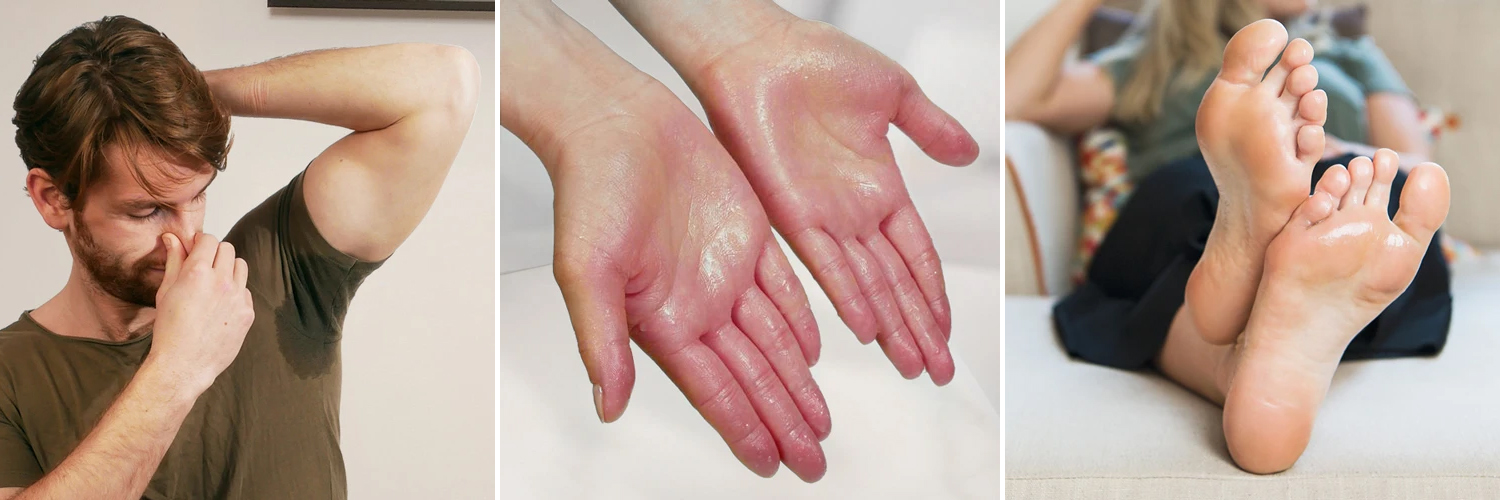Efficient Dermatology Solutions for Excessive Sweating: How to Stop Sweaty Hands and Feet
Efficient Dermatology Solutions for Excessive Sweating: How to Stop Sweaty Hands and Feet
Blog Article
Recognizing the Source of Excessive Sweating and Its Influence On Day-to-day Live
Excessive sweating, likewise called hyperhidrosis, is a problem that affects a considerable section of the populace, yet its hidden causes and implications on everyday operating remain somewhat enigmatic. While it is frequently recognized as a physical response to regulate body temperature, the triggers for extreme sweating can vary commonly among people, incorporating not just physical variables but also emotional and psychological elements. Moreover, the effect of this problem prolongs past simple discomfort, commonly affecting social communications and general lifestyle. By diving into the origin of hyperhidrosis and discovering its complex impacts, a deeper understanding of this pervasive issue can be obtained, clarifying the intricacies that people facing too much sweating browse each day.
Physiology of Sweat Glands
The guideline of sweat production, an essential physical process, is largely managed by the activity of gland distributed throughout the body. Sweat glands are categorized right into 2 primary kinds: eccrine and apocrine glands. Eccrine glands are the most countless and are discovered in almost all locations of the body. They play a vital role in thermoregulation by producing a watery fluid onto the skin's surface area, which aids and evaporates cool down the body down. On the other hand, apocrine glands are concentrated in locations abundant in hair roots, such as the armpits and groin, and their secretions are thicker and milky in look.
When the body temperature increases, either as a result of exercise, high temperatures, or psychological tension, the worried system triggers the sweat glands to create sweat. This sweat is made up primarily of water and electrolytes like sodium and chloride. The process of sweat manufacturing is crucial for maintaining the body's internal temperature level within a narrow, optimum range, highlighting the vital function gland play in human physiology.
Triggers for Excessive Sweating
In understanding the source of extreme sweating, it is vital to recognize the triggers that can lead to this physiological reaction. Extreme sweating, likewise understood as hyperhidrosis, can be triggered by different aspects, both ecological and physiological. One common trigger is emotional tension or anxiety, which can stimulate the body's sweat glands to produce more sweat than is necessary for cooling down. Physical physical effort, heats, and spicy foods are also known to trigger excessive sweating in people vulnerable to this problem. Certain clinical problems like diabetes, hyperthyroidism, or menopause can contribute to excessive sweating as well.
Moreover, medications such as some antidepressants, opioids, and particular supplements can likewise act as triggers for hyperhidrosis. Recognizing these triggers is vital in managing too much sweating efficiently - How to stop sweaty hands. By identifying and resolving the details triggers that trigger too much sweating in a private, doctor can develop individualized treatment strategies to ease this problem and enhance the person's lifestyle
Medical Conditions Associated
Connected with excessive sweating are different clinical problems that can intensify this physiological action. One common condition is hyperhidrosis, a condition identified by abnormally enhanced sweating that goes beyond the body's thermoregulatory demands. This can manifest in focal areas like the hands, soles, underarms, or face, influencing a person's quality of life because of social shame and pain.
Additionally, endocrine disorders such as hyperthyroidism, diabetes, and menopausal warm flashes can likewise lead to excessive sweating. Hyperthyroidism causes an overflow of thyroid hormones, accelerating metabolic rate and activating sweating.
In addition, infections like hiv, consumption, and endocarditis have been related to evening sweats, a typical symptom recognized to interrupt sleep and impact total well-being. These medical conditions highlight the varied range of underlying factors that can add to excessive sweating, demanding thorough analysis and administration by healthcare experts.
Psychological and psychological Factors

Influence On Social Interactions
Too much sweating can have profound effects on a person's capacity to engage pleasantly in social interactions. The noticeable signs of sweat spots or damp patches on garments can bring about humiliation and self-consciousness, creating people to withdraw from social scenarios. This withdrawal can impact connections, restriction social activities, and impede individual and specialist development.

In addition, the anxiousness and self-worth concerns originating from excessive sweating can affect communication and interpersonal skills. Individuals may have a hard time to concentrate on discussions, get involved in team tasks, or share themselves with confidence. This can result in feelings of seclusion and loneliness, as social connections become challenging to maintain.
Conclusion

While it is frequently comprehended as a physiological response to manage body temperature level, the triggers for extreme sweating can vary extensively amongst individuals, encompassing not just physical aspects however psychological and additionally psychological Treatment for hyperhydrosis of hands components. By delving into the origin triggers of hyperhidrosis and exploring its complex impacts, a deeper understanding of this prevalent issue can be obtained, dropping light on the complexities that people grappling with extreme sweating browse on an everyday basis.
Physical exertion, high temperature levels, and spicy foods are likewise recognized to activate excessive sweating in people susceptible to this condition. By determining and dealing with the details triggers that trigger too much sweating in a private, healthcare carriers can establish personalized treatment strategies to minimize this problem and enhance the person's quality of life.
Too much sweating can have profound results on an individual's ability to engage conveniently in social interactions.
Report this page